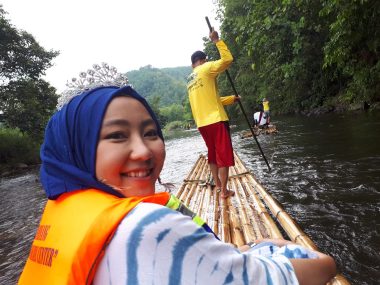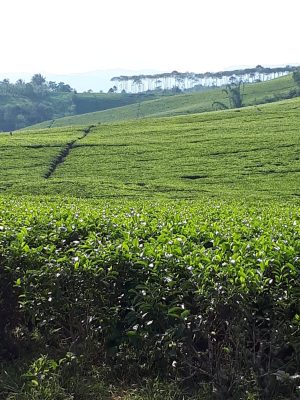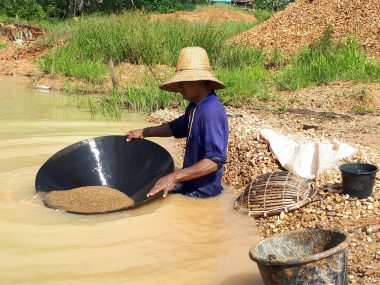Life is a long, calm river, or is that Asian serenity? For three hours, the bamboo raft, which was put together the day before, has been gliding across the Amandit River. On board the improvised water vehicle: the current “Miss Tourism” of the region, Raisa Nurtanziliana, and me. The narrow vehicle rocks above the waves, gently we glide down wave after wave. Raisa sings: A traditional Indonesian lullaby with which she almost puts me to sleep in the middle of the day. Everything moves, some things turn, everything is good.

Next to the river, the landscape drifts lazily by, trees, wooden huts, people who devote themselves to their day’s work. A calming world in green, now unfortunately attacked by the achievements of civilization: trees, bushes, bamboo – a refreshing, magnificent triad that lines the gentle banks next to the raft. Every now and then a larger stone, which our ferryman skillfully curves around, stands out of the water. The young man is helped by a long stick, which he lifts into the floods. And Raisa sings…
Behind us lie two nights in a camp, without comfort, only a mattress separates the sleep-seekers from the bare wooden floor in the small, lined up huts. The climb up here was so steep that our bus ran out of power several times and just stopped just before reaching the next hilltop; before it could finally go on again at some point: As if the car first had to gather strength and then fight the slope again. When we finally arrived at the camp, our group quickly felt like the scouts. The conditions at Resort Amandit seem to have been lovingly improvised. So the often all-covering comforts of the Western affluent countries fall away here – at least as far as food is concerned. Morning, noon, evening, the same thing always ends up on the plate of the camp community: cold chicken, rice and an unidentifiable vegetable addition. “You have to finish eating, otherwise you won’t have the strength for rafting,” our experienced guide advises those who hesitate to have their tin bowl filled with the same thing over and over again. Sigh. All right, “then chicken with rice again, please. And later I’d like to have a tea.” Young, veiled, Muslim women fulfill the request with a smile. Standing behind a camping table, they reach for a huge ladle and add to the overnight guests they don’t know.
Every year in November, this place in the Indonesian mountains hosts a remarkable festival, which includes local dances, singing and a cooking competition. The women of the area serve up what has been served in this part of the world for centuries: especially chicken, spices and vegetables cut into pieces. Everything is stuffed into hollow bamboo canes, which the competitors from the various villages immediately cook over smoldering campfires. It is a good 30 minutes to wait, then those present can eat their way through traditional Asian cuisine. Beauty queen Raisa, who has put on her sash with the inscription “Daughter of Tourism” for the occasion, helps to select the winners: “We not only evaluate the taste of the food, but above all the presentation and how much effort the women have put into the presentation. This competition is of great importance to us.”

The camp is part of the small village of Loksado, which in turn belongs to the province of South Kalimantan. We have been here for days now, in the southeast of the island of Borneo; the capital is Banjarmasin. Fruit, vegetables and other delicacies can be purchased here from boat to boat at the “Lok Baintan Floating market”, which is a very special experience for Europeans and other well-travelled people, but is everyday life for locals. The women of the area often laugh as they advertise their wares and chat in the middle of the Barito River. In between, the few tourists who have been driven to the river at dawn are offered their own products. Above all, these are bananas, oranges, the exotic soursop (soursop), exotic-sweet cherimoyas. Action is mandatory, as the guide explains to us. One of the villagers’ duties is to provide visitors on the guest boats with samples of local culinary delights, including coffee. And so mini bananas and a lot of other delicious bites will soon land in our vehicle. The prices are more than affordable even without the obligatory haggling, the weather is nice and warm as always, so we grab it in a good mood. Souvenirs are advertised from some barges or Indonesian pointed hats, shirts and trousers. An entire shopping center on boats, in other words. The way back to the hotel takes another whole hour, past countless huts that are enthroned on stilts above the river. Their owners wash their clothes in the sluggishly flowing Barito River from five o’clock in the morning. They themselves and their little ones usually jump in themselves, they scrub themselves thoroughly, submerge briefly.

Unfortunately, the area is massively endangered by the deforestation of the rainforest; gold mining with the help of the amalgam process is also still practiced in Indonesia . In the process, toxic mercury enters the soil and the air – a practice that massively threatens the health of the workers who use it. In view of the bristling nature of the world’s fourth-largest state, however, these thoughts are lost for the time being. It is green, it is still blooming in this part of Asia. The floral splendour is due to the abundant rainfall and the generally humid climate on the islands of this state.
One “green” inhabitant in particular, the giant flower Rafflesia, appreciates this circumstance. If you are lucky, you will experience the plant with its gigantic diameter, up to one metre, during its flowering period. This is only a manageable four to seven days until the bombastic Rafflesia disintegrates into viscous black mucus. Thanks to the size record, the mega plant can still be found on the “bucket list” of numerous tourists. In addition, Americans or Europeans also like to visit Sumatra’s tea and pepper plantations. Sometimes the visitors fight their way through dense rain, which admittedly has a few downsides in addition to its usefulness for the fauna. The Indonesian capital Jakarta , for example, is flooded by floods from time to time. Namely, when the rainy season breaks over this zone, which is mainly inhabited by Muslims. Endless floods then seem to break over the area.
Are you also interested in a trip to Indonesia?
See https://www.indonesia.travel/de/de/home for a wide range of travel options. Direct information can also be obtained from: Global Communication Experts GmbH
Hanauer Landstr. 184
60314 Frankfurt
P: +49 69 17 53 71-064
F: +49 69 17 53 71-065
m: visit.indonesia@gce-agency.com
W:
www.indonesia.travel
, www.gce-agency.com


